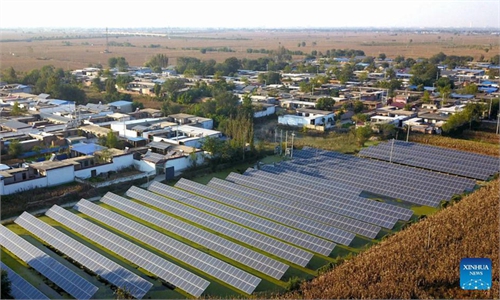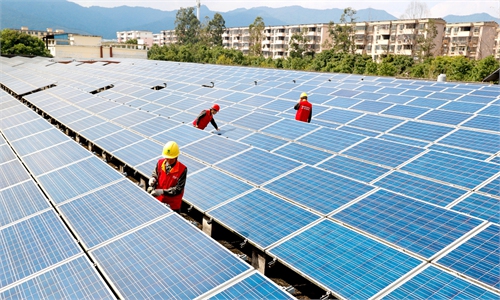COMMENTS / EXPERT ASSESSMENT
US efforts to isolate China from solar industry to end in futility

Illustration: Tang Tengfei/Global Times
A US development agency focusing on emerging markets announced on Tuesday approval to finance the country's largest solar manufacturing company to build a factory in India, which has been widely viewed as a move aiming to weaken China's leading role in the industry.The US International Development Finance Corporation (DFC) will provide finance up to $500 million to the US-based First Solar Inc for its previously announced vertically integrated photovoltaic (PV) solar module manufacturing facility in Tamil Nadu, India, according to a DFC statement seen on its website.
It's hardly breaking news that the US, ganging up with its followers, has been promoting a "decoupling China" campaign across critical industrial chains, with the solar panel industry emerging as a key battleground.
However, apart from the fact that the US' $500 million effort to isolate China from the global solar industry represented a colossal waste of money, it is also an impossible mission for the US and its partners to establish new industrial chains outside of China, the world's largest manufacturing hub and an unrivaled growth market.
India indeed is a potential market for the solar panel industry, given its challenges in energy and restrictions on thermal power generation. The Modi administration has stepped up efforts to bolster the country's development in solar; however, what cannot be ignored is that about 90 percent of the components and parts for its solar manufacturing originate from China.
India's high industrial dependency on China has been tested after New Delhi's years of ill-advised efforts on disengaging with China economically, from restricting scrutiny over Chinese investments to banning Chinese apps. Yet, bilateral trade between China and India is set to break a new record after passing the $100 billion milestone for the first 10 months of 2021.
As for China, after decades of cultivation and accumulation, it has become the only country in the world to have all the industrial categories listed on the United Nations industrial classification. It is the world's largest producer of over 220 types of industrial products, including the solar panels which China accounts for 70 percent of the global output.
As the largest trading partner for over 120 countries and regions, China maintains plentiful opportunities to promote the growth of its solar industry despite the US' efforts in cajoling allies to block China; not to mention that even within the US' small groups, it is extremely hard to form a single new supply chain completely cutting out China.
In addition, given that over half of the polysilicon used in solar panels worldwide originate from Northwest China's Xinjiang Uygur Autonomous Region, it's worth pointing out that the US move has also revealed that playing the "Xinjiang card" has never been about defending human rights; instead, the baseless "human rights" accusation targeting Xinjiang is merely a fairytale cooked up by anti-China forces in the West to contain the growth of Chinese industries and essentially the development of China. The solar industry appears to be among one of their main targets.
Though there is an accelerating trend for the US-led Western world attempting to undermine China's role in the global industrial chain, China has been committed to its agenda of opening up domestic market to the world which will be the exact foundation for the country to break through any underhanded geopolitical moves targeting trade.
Chinese companies, including the solar panel producers, may encounter stiffer headwinds in the future, but their growth on the global stage will not be strangled as long as they can keep developing and upgrading core technologies and march toward the higher end of a range of industrial chains.
The article was compiled based on an interview with Liu Zongyi, secretary-general of the Research Center for China-South Asia Cooperation at the Shanghai Institutes for International Studies. bizopinion@globaltimes.com.cn



